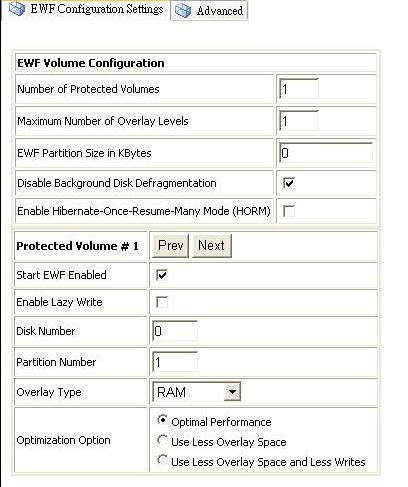請先看『使用說明』
WINXPE:Windows Embedded Standard
From LEXWiKi
Contents |
Production Instruction
1. Please format the storage device first (ex. CF card). If that is FAT32 after format please switch on the machine by using Windows XP Embedded tool called "bootprep" (in DOS mode).
You don't need to do this if it is NTFS after format.
2. Please copy the files to the pre-format storage device (ex. CF card) which can be used to switch on the machine and then please re-switch on the machine in Target device.
By doing this, you can get into XP-Embedded First Boot Agent (FBA) and decompress files and structure an operating system.
Download Request Form as below if you would customize your own Windows Embedded Standard(XPe)
File download
1.Intel
2.VIA
UID: sales
PWD: sales
Check basic component list in Standard image
EWF Overview (System protect function)
The Enhanced Write Filter (EWF) protects a volume from write access. EWF provides the following benefits:
- Write-protects one or more partitions on your system
- Enables read-only media, such as CD-ROM or flash, to boot and run
EWF can be deployed on a variety of media types and configurations. The two major components for EWF are the EWF Overlay and the EWF Volume:
- EWF Overlay:
EWF protects the contents of a volume by redirecting all write operations to another storage location. This location is called an overlay. An EWF overlay can be in RAM, or on another disk partition. An overlay is conceptually similar to a transparency overlay on an overhead projector. Any change that is made to the overlay affects the picture as it is seen in the aggregate, but if the overlay is removed, the underlying picture remains unchanged.
- EWF Volume:
In addition to the EWF overlay, an EWF volume is created on the media in unpartitioned disk space. This EWF volume stores configuration information about all of the EWF-protected volumes on the device, including the number and sizes of protected volumes and overlay levels. Only one EWF volume is created on your device, regardless of how many disks are in the system. If your media does not support multiple partitions, you can save the EWF configuration information in the system's registry.
There can be only one EWF volume on the system. However, there can be more than one protected volume, and it is possible to have some volumes that are protected by disk overlays while others are protected by RAM overlays.
EWF Mode EWF Overlay Location EWF Volume Location Description
Disk On disk Created on disk in unpartitioned space EWF stores overlay information in a separate partition on the system. Because the overlay is stored in a nonvolatile location, the EWF overlay information can persist between reboots. Use EWF Disk types on a system if you want to maintain the state of the system
Ram Reg In Ram In system registry RAM Reg overlays store overlay information in RAM. However, the configuration information about EWF is not stored in a separate EWF volume, but within the registry.
FAQ
Q1. If customer purchases built-in XPE software, will LEX provide the licensed CD?
| Ans: |
Basically, unlike XP system on PC, there's no CD installation for XPE. It was created by a platform builder called Target Designer (TD) in image file format which contains all necessary configurations. Once the image file was copied to the target HDD, it will initiate the FBA process (First Boot Agent) to configure the system as XPE when first boot (it's more like unzipping the image file to be system files) The license was entered into TD prior starting to create the image, so there's no license require afterward.
1.After entering Windows, you shouldn’t see “Microsoft Windows XP Embedded” term on the bottom right of your desktop if you are using original version. 2.The license sticker on the case ( Microsoft usually judge the license legality by the sticker) |
|---|---|
| Patch File: | |
| Defect: |
N/A |
| Asker: |
Larisa - Thursday, August 07, 2008 5:31 PM |
| Provider: |
Denny - Thursday, August 07, 2008 5:58 PM |
How to protect file with EWF in XPe
| Ans: |
在 Target Designer 中加入 EWF 相關components, 其中包含 ewfmgr.exe ewfmgr.exe是在run-time中管理ewf 可以對stroage進行配置, 使能(enable), 禁止, 更改, 進一步達到保護的作用 關閉EWF保護指令為 ewfmgr c: -disable, 可關閉 C drive EWF 保護功能 開啟EWF保護指令為 ewfmgr c: -enable , 可凱起 C drive EWF 保護功能 ( 需注意, 無論開啟或關閉皆須重啟電腦才會生效) |
|---|---|
| Patch File: |
N/A |
| Defect: |
N/A |
| Asker: |
Sato yoichro 2009/06/25 |
| Provider: |
Denny 2009/06/25 |
如何在 Target Designer 中加入 EWF 元件 ?
| Ans: |
必須在 Target Designer 中加入以下元件 1. Enhanced Write Filter Component (主要元件之一, 包含對EWF的設置與檔案) 2. EWF NTLDR Component (修改過的 NT Loader, 使其可以從EWF保護中的磁區開機) 3. EWF Manager Console Application (包含ewfmgr.exe, 任何有關EWF的指令都是經由ewfmgr.exe來下命令) 4. Enhanced Write Filter API (EWF的API, 讓ap可以透過api對ewf作存取控制) 其中, Enhanced Write Filter Component中可以設定EWF的選項, 如下 Number of Protected Volumes 設定 EWF volume 保護數量. 範圍: 1-9. Maximum Number of Overlay Levels 設定最大 overlay level. 範圍: 1-9. EWF Partition Size in KBytes 設定 EWF Partiotion size. Disable Background Disk Defragmentation Yes/no 啟動或關閉 Background disk defragmentation Enable HORM Yes/no 啟動或關閉 HORM Protected Volume Prev/Next Buttons 針對每一個 EWF Volume做設定, 選擇前一個或後一個volume Start EWF Enabled Yes/no 啟動或關閉 EWF 保護 Enable Lazy Write Yes/no 啟動或關閉 Lazy Write Disk Number 指定該 EWF volume 在第幾個硬碟 Partition Number 指定該 EWF volume 在第幾個磁區 Overlay Type 選擇 EWF 保護的模式(Disk, Ram, Ram(Reg)) Optimization Option 選擇 EWF 最佳化模式 |
|---|---|
| Patch File: |
N/A |
| Defect: |
N/A |
| Asker: |
Denny 2009/07/01 |
| Provider: |
Denny 2009/07/01 |

